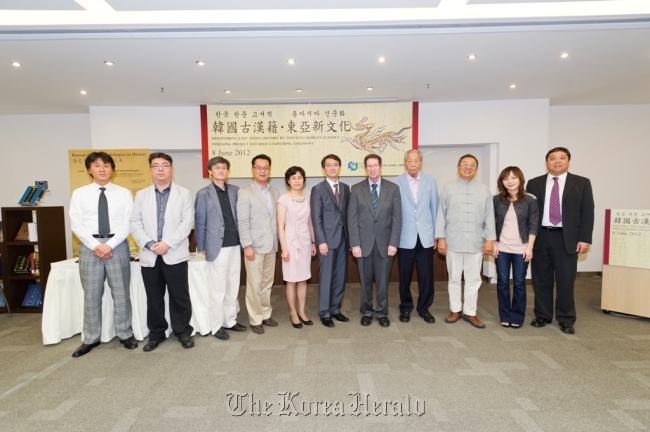Chinese, Korean and U.S. researchers have created an extensive online database for Korean classics in Chinese, Korean and Romanized Korean as part of their East Asian studies project, City University of Hong Kong (CityU) said Sunday.
The database created by researchers from CityU and partner institutions in Korea and the U.S. is a collection of 3,000 volumes of old Korean literature written in classical Chinese.
“The collection is now easy to browse through, thanks to this cross-regional and cross-linguistic collaboration between CityU and its U.S. and Korean partners,” said CityU professor Steve Ching Hsianghoo at the launch ceremony last Friday.
 |
Participants of the launching event for an ancient Korean literary classics online database pose for a photo Friday in Hong Kong. From left: Chang Jae-yong, East Asia Library of UC Berkeley librarian; Kwon Hyuk-chan, City University of Hong Kong (CityU) assistant professor; Han Jeong-hee, Kyungin Publishing Company CEO; Jung Chang-won, Jeju National University professor; Hwang Xiaomei, Central China Normal University vice president; Han Jae-jeuk, culture and press consul of Consulate General of the Republic of Korea in Hong Kong; Arthur Ellis, CityU provost; Dr. Csze Chi Ching of CityU; Cheng Pei-kai, director of CityU’s Chinese Civilization Center; Julia Han Ji-yeon, instructor in the department of Chinese, Translation and Linguistics at CityU; and Steve Ching Hsianghoo, CityU professor. (City University of Hong Kong) |
The University of California, Berkeley, Jeju National University and Kyungin Publishing Company took part in the project.
Han Jae-heuk, consul of the Consulate General of the Republic of Korea in Hong Kong, said the creation of the database would contribute to promoting mutual understanding between Hong Kong, mainland China, Korea and the rest of the world.
The Korean Anthology in History covers a range of topics including philosophy, history, literature, politics, society, economics, the military, geography and astronomy written by Korean authors from the 7th century to the 20th century.
According to the CityU, the completion of the database has been challenging because it is not easy to read Korean works written in classical Chinese, which have a different writing style and word usage, and lack punctuation.
The university expects the database will help researchers look up information about a particular period in which the works were written and preserve classical Chinese works by Korean authors.
By Lee Woo-young (
wylee@heraldcorp.com)








![[Today’s K-pop] Blackpink’s Jennie, Lisa invited to Coachella as solo acts](http://res.heraldm.com/phpwas/restmb_idxmake.php?idx=644&simg=/content/image/2024/11/21/20241121050099_0.jpg)